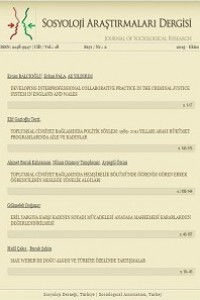Öz
Due
to immigration, lifestyle and dietary habits transform depending on the change
in the socio-economic situation, social position, and status of migrants. These
changes can be observed in various stages, such as in the availability of food
and its preparation, and consumption. This
article attempts to demonstrate the transformation in dietary habits after
immigration of people who migrated to Turkey since 2011 due to the Syrian war.
The study focused on the
city of Mardin, located in southeastern Anatolia, and was conducted in the form
of fieldwork. Using snowball sampling methods, participant observation, and
qualitative research techniques, in-depth interviews were made with 25
people who migrated to Mardin from different regions of Syria. The change in dietary habits varies greatly in parallel
with the amount of change in socio-economic status to a large extent. However,
there was some differentiation in terms of food structure and diet. This study
shows that immigrants’ views on food were different. It was observed that
Syrians continued their traditional dietary habits or fully adopt the dietary
habits of the new country or engage in a hybridization of dietary practices due
to cultural transition.
Anahtar Kelimeler
Immigration Food Change Adaptation Kitchen Acculturation Syrian Immigrants
Kaynakça
- Apak, H. (2014). Suriyeli göçmenlerin kente uyumları: Mardin örneği, Mukaddime, 5 (2), 53-70. Apak, H. (2015). Suriyeli göçmenlerin gelecek beklentileri: Mardin örneği, Birey ve Toplum Sosyal Bilimler Dergisi, 5(9), 125-142. Bailey, A. (2017). The migrant suitcase: food, belonging and commensality among Indian migrants in the Netherlands, Appetite, Vol. 110, 51-60. Berry, J. W. (2005). Acculturation: living successfully in two cultures, International Journal of Intercultural Relations, Vol.29, 697-712. Chambers, I. (2014). Göç, kültür, kimlik, (I. Türkmen and M. Beşikçi Trans.), İstanbul: Ayrıntı. Çağaptay, S. (2014). The impact of Syrian refugees on Southern Turkey, The Washington Institute for Near East Policy. Ezme, A. T. (2016). Muslım immıgrants food culture and its effect on locatıon preference, Süleyman Demirel Üniversitesi Sosyal Bilimler Enstitüsü Dergisi, CİEP Özel Sayısı, 735- 759. Fieldhouse, P. (2002). Food and nutrition; customs and culture, Cheltenham, UK: Nelson Thornes Ltd. Fischler, C. (1988). Food, self and identity, Social Science Information, 27, 275-293. Fischler, C. (2011). Commensality, society and culture, Social Science Information, Vol. 50, 3-4. Goody, J. (2013). Yemek, mutfak, sınıf -karşılaştırmalı sosyoloji çalışması- (M. Günay Güran Trans.), İstanbul: Pinhan. Gürhan, N. (2017). Yemek ve din: yemeğin dini simgesel anlamları üzerine bir inceleme, Journal of the Human and Social Science Researches, Vol. 6 (2), 1204-1223. Güvenç, B. (2002). Kültürün ABC’si, Cogito, Vol.67, İstanbul, Yapı Kredi. Harbottle, L. (1997). Fast food/spoiled idendity. Iranian migrants in the British catering trade, (Ed) P. Caplan, in Food, Health and Identity, New York: Routledge. Kanık, İ. (2016). Gastro gösteri-popüler kültür ürünlerinde yemeğin kültürel gösterisi, İstanbul: Ayrıntı. Kershen, A. J. (2014). Food in the Biritish immigrant experience, Crossings: Journal of Migration and Culture 5: 2,3, 201-211. Koç, M., Welsh, J. (2001). Food, foodways and ımmigrant experience, Paper written for the Multiculturalism Program, Department of Canadian Heritage Program at the Canadian Ethnic Studies Association Conference, Halifax. https://www.researchgate.net/profile/Mustafa_Koc2/publication/253449347_Food_Foodways_and_Immigrant_Experience/links/0a85e52fe76e2cff51000000/Food-Foodways-and-Immigrant-Experience.pdf. Kolukırık, S. (2014). Uluslararası göç ve Türkiye: Yerel Uygulamalar ve Görünümler, Zeitschrift Für Die Welt Der Türken Journal Of World Of Turks, 6 (2), 37-53. Lordoğlu, K., Aslan M. (2016). En fazla Suriyeli göçmen alan beş kentin emek piyasalarında değişimi: 2011-2014, Çalışma ve Toplum, S.2, 789-808. Nicolaou, M. Doak, C. M., Van Dam, R. Brug, J. Stronks, K. Seidell, J. C. (2009). Cultural and social influences on food consumption in Dutch residents of Turkish and Moroccan origin: a qualitative study, Journal of Nutrition Education and Behavior, Vol. 41, 232-241. Oussedik, S. (2012). Food and cuisine: part of the migration process, Quaderns de la Mediterrània, Vol. 17, 55-60. Özkarslı, F. (2015). Mardin’de enformel istihdamda çalışan Suriyeli göçmenler, Birey ve Toplum Sosyal Bilimler Dergisi, 5(1), 175-192. Parasecoli, F. (2014). Food, ıdentity, and cultural reproduction in ımmigrant communities, Social Research, 81(2), 415-440. Satia Abouta, J. Patterson, R., Neuhouser, M. L., Elder, J. (2002). Dietary acculturation: applications to nutrition research and dietetics, Journal of the American Dietetic Association, Vol. 102(8), 1105-1118. Sauner-Leroy, M.H. (2012). Yemeğin değişken anlamları ve göç: İstanbul’daki Fransızların yemek alışkanlıkları üzerine bir değerlendirme, (Eds.) A. Avcı, S. Erkoç and E. Otman, in Yemekte Tarih Var -Yemek Kültürü ve Tarihçiliği-, İstanbul: Tarih Vakfı Yurt. Scholliers, P. (2008). Yenilik ve gelenek: gastronominin önündeki yeni ufuk, (Ed). S. Haznedaroğlu, (N. Elhüseyni Trans.), İstanbul: Oğlak. Terragni, L., Garnweidner, L. M., Pettersen, K. S., Mosdøl, A. (2014). Migration as a turning point in food habits: the early phase of dietary acculturation among women from South Asian, African, and Middle Eastern Countries living in Norway, Ecology of Food and Nutrition, Vol. 53, 273-291. Visser, S. S., Bailey, A., Meijering, L. (2015). Food, faith and community: social well-being of Ghanaian migrants in the Netherlands, Gender, Place & Culture, Vol. 22 (5), 608-625. Wandel, M., Ra˚berg, M., Kumar, B. Holmboe-Ottesen, G. (2008). Changes in food habits after migration among South Asians settled in Oslo: the effect of demographic, socio-economic and integration factors, Appetite, Vol.50, 376-385. Yalçın, C. (2004). Göç sosyolojisi, Ankara: Anı. Zafer, A. B. (2016). Göç çalışmaları için bir anahtar olarak “kültürleşme” kavramı, Uludağ Üniversitesi Fen-Edebiyat Fakültesi Sosyal Bilimler Dergisi, Vol.3, 75-92. AFAD (2018). Geçici barınma merkezleri, on 19 March 2018, Retrieved from https://www.afad.gov.tr/upload/Node/2374/files/13_03_2018_Suriye_GBM_Bilgi_Notu.pdf . AFAD (2017). Türkiye’deki Suriyelilerin demografik görünümü, yaşam koşulları ve gelecek beklentilerine yönelik saha araştırması, on 19 March 2018, Retrieved from https://www.afad.gov.tr/upload/Node/25337/xfiles/17a-Turkiye_deki_Suriyelilerin_Demografik_Gorunumu_Yasam_Kosullari_ve_Gelecek_Beklentilerine_Yonelik_Saha_Arastirmasi_2017.pdf.
Ayrıntılar
| Birincil Dil | Türkçe |
|---|---|
| Bölüm | Makaleler |
| Yazarlar | |
| Yayımlanma Tarihi | 29 Ekim 2018 |
| Gönderilme Tarihi | 26 Haziran 2018 |
| Yayımlandığı Sayı | Yıl 2018 Cilt: 21 Sayı: 2 |

This work is licensed under a Creative Commons Attribution-NonCommercial 4.0 International License.
Sosyoloji Araştırmaları Dergisi / Journal of Sociological Research
SAD / JSR


